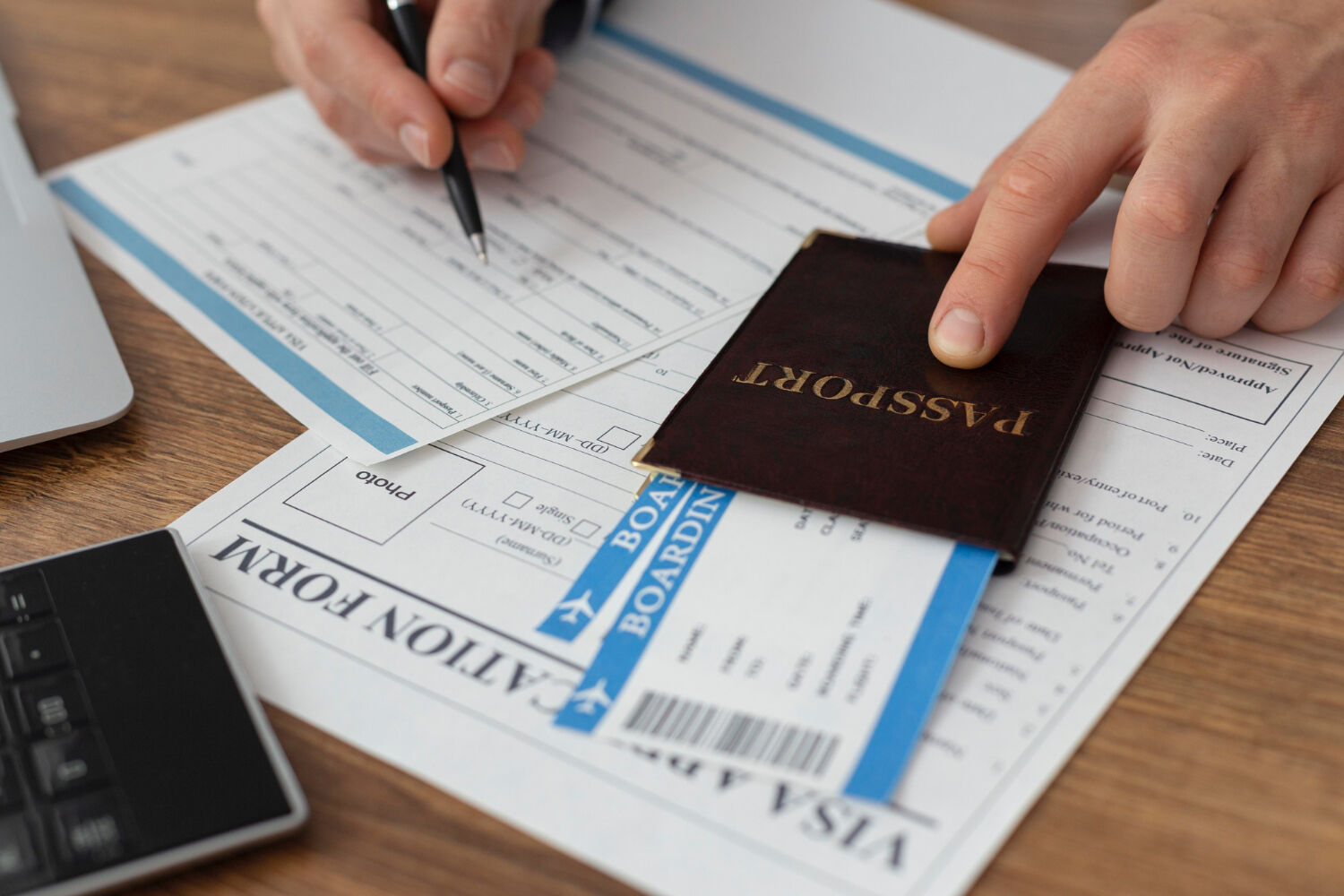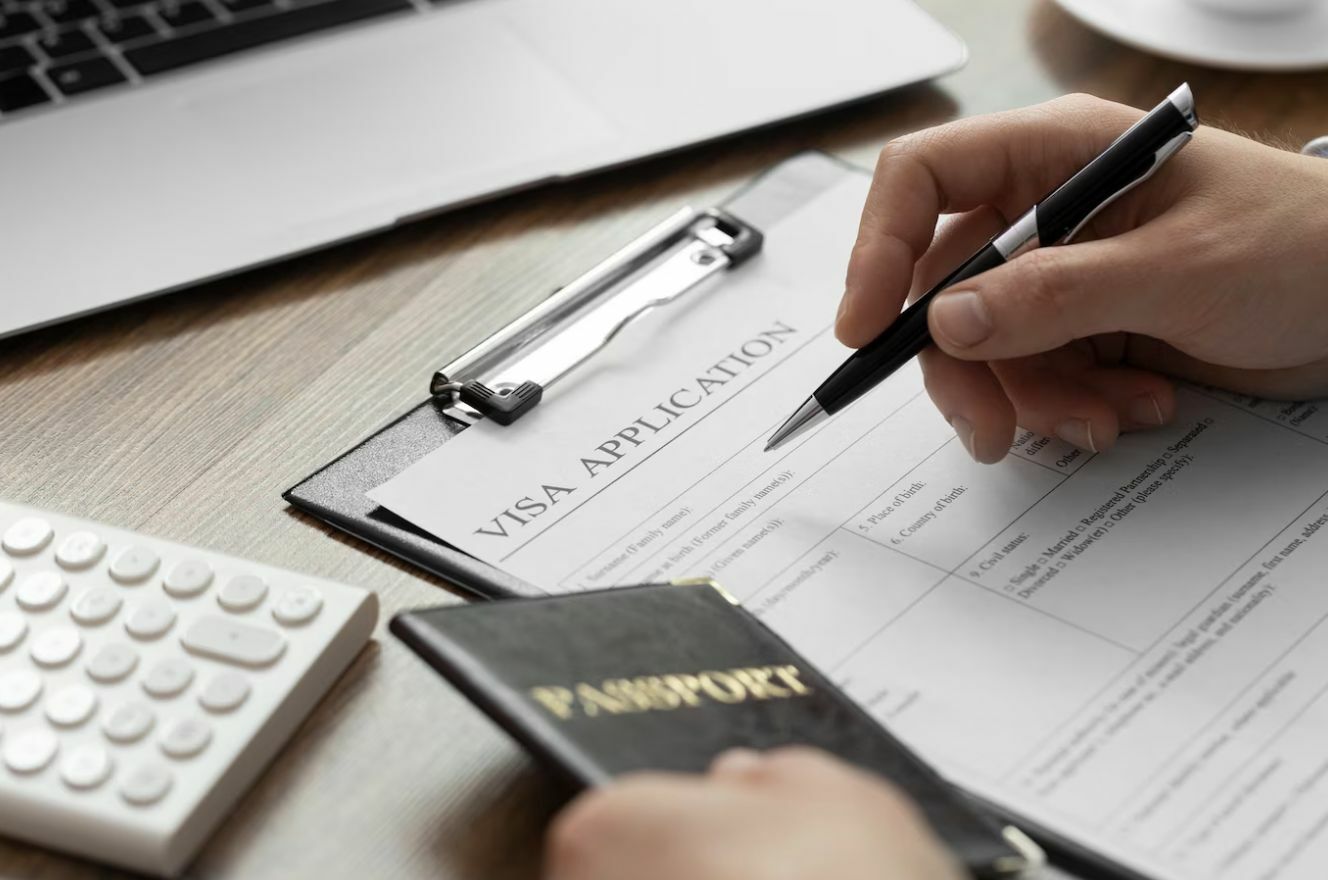Business and work visas in Thailand: What you need to know
A quick guide on obtaining Non-Immigrant Visa B

Dreaming of working or doing business in the sunny paradise of Thailand? You’ve probably heard the terms “business visa” or “work visa” dropped in conversations or spotted in your Google searches. But did you know these terms are just simpler ways of referring to the Non-Immigrant Visa B? This is the visa you need if you’re a foreigner looking to work or start a business in Thailand. Want to know the requirements, application process, benefits, and validity of this visa? Well, here’s everything you need to know about the Non-Immigrant Visa B.
What is the Thailand Non-Immigrant Visa B?

If you’re a foreigner who needs to travel to Thailand for business reasons, you’ll typically need the Thailand Non-Immigrant Visa B or the Non-B visa. This type of visa is particularly relevant for those who intend to conduct business without payment, engage in paid employment, or invest in a Thai business.
It’s important to keep in mind that holding a Non-Immigrant Visa B simply means that you have been granted permission to enter Thailand with the intention to work or do business. However, possessing this visa does not automatically allow you to undertake employment in Thailand. It rather serves as the preliminary step to apply for a Thai work permit, which is a separate document required to legally work on Thai soil.
If you find yourself having to travel to Thailand for business frequently, there’s an option to secure a one-year business visa which permits multiple entries. Each entry under this visa allows for a stay of up to 90 days, thereby accommodating extended business activities.
What are the categories under the Non-Immigrant Visa B?
Non-Immigrant Visa B basically falls into two distinct categories.
1. Non-Immigrant Visa B to conduct business
First up is the Non-Immigrant Visa B for those planning on doing business in Thailand. It’s a two-step process – you begin with a 90-Day single-entry visa that you can secure from a Thai embassy or consulate in your home country. After your work permit is ready, with a sponsorship from a Thai entity or company, you can upgrade this to a 1-Year multiple-entry visa. This is handy for those who foresee frequent travel in and out of Thailand.
2. Non-Immigrant Visa B for employment
The other category is the Non-Immigrant Visa B for employment purposes. If you intend to work in Thailand, this is the route to take. Similar to the business visa, you start off with a 90-Day Non-Immigrant Visa B, only this time, your prospective Thai employer will sponsor your application. During this 90-day period, you apply for your work permit. Once secured, you are eligible to request a 1-Year Non-Immigrant Visa B extension at the local immigration office.
Do remember that with this visa, you are required to report your address every 90 days at the Thai Immigration Office. A re-entry permit is mandatory if you plan to travel outside Thailand during this period. The plus side? You can renew this visa within Thailand itself.
What are the requirements to apply for the Non-Immigrant Visa B?

If you’re eyeing up the Non-Immigrant Visa B, you’ll first need to land a job with a company in Thailand or establish your own company there and employ yourself. However, be mindful that not all Thai companies are authorised to hire foreigners. Specifically, a company must have a capital of more than 2 million baht for every foreign employee and maintain a Thai-to-foreign employee ratio of 4:1. Interestingly, these requirements drop off the radar if your company, or the one hiring you, has a stamp of approval from Thailand’s Board of Investment (BOI).
Do you need a degree to get the Non-Immigrant Visa B?
If you plan to apply for a Non-Immigrant Visa B in Thailand, don’t worry if you don’t have a degree. If you secure employment in a Thai company, your chances of obtaining the visa are high, whether you hold a university degree or not.
Even so, a bachelor’s degree is often a job requirement in Thailand for most roles. But if you don’t hold one, it’s not the end of the road. In certain areas, having good work experience can boost your chances of finding employment.
One thing to note, though, is that you must have a bachelor’s degree if you want to teach English in Thailand. So, whether or not you need a degree really depends on what you plan to do in Thailand.
What is the application process like?
Applying for the Non-Immigrant Visa B involves a series of steps. Let’s break them down:
Step 1: Prepare your documents
The first thing you need to do is to gather all the necessary documents. This includes not only your personal paperwork but also official documentation from the company or organisation that is employing you in Thailand.
Individual documents

The following are the individual documents you need to prepare:
- A copy of your passport: Make sure it is valid for over six months and has two blank pages. Although you can apply for a Non-Immigrant Visa B with six months left on your passport, doing so with a passport that has more than two years of validity is a more relaxed approach, freeing you from stress about transferring the Non-Immigrant Visa B to a new passport.
- An application form: You should be able to download the form from the embassy/consulate’s website. Alternatively, you can also get the form from the embassy/consulate if you apply in person. This needs to be completed as accurately as possible.
- Two passport-size photos (4×6 cm): Ensure they’re recent (within the last six months) and set against a white background. Be sure to have a neutral facial expression and stare straight ahead. In addition, your entire face has to be fully visible. This means that you shouldn’t wear a hat or anything covering your head. The only exception is for religious reasons, but even then, your face still needs to be visible. If you wear glasses, that’s fine, as long as they don’t hide your eyes or have thick frames.
- Bank statement: This should show a balance of at least 20,000 baht if you’re applying as a single individual or 40,000 baht for a family application.
- Degree, transcripts and an employment certificate from the previous employer, if applicable: If you have one, it can be useful to your employer for securing approval from relevant government organisations. However, the Thai embassies might not ask for them.
- Copy of work permit, if applicable: If you’ve previously worked in Thailand, you should prepare a copy of your work permit.
Company documents

In addition to personal documents, the employer in Thailand also needs to contribute to the pile of paperwork for the Non-Immigrant Visa B application. Here’s what your employer should provide:
- An approval letter: This comes from a related government institution like the Ministry of Labour or the Board of Investment, validating the hiring of foreign employees. Securing this approval involves the employer submitting a raft of documents, so allow a few weeks for this step.
- An invitation letter: Your employer should draft this, detailing your role, salary, length of contract and job responsibilities.
- Business registration and licence: These official documents verify the legality and nature of the company.
- VAT registration certificate: This is another piece of evidence to confirm the legitimacy of the company.
- A shareholder list: This gives an insight into the company’s ownership.
- A list of all foreign workers in the company: This document should include the name, nationality, position and salary of each foreign employee.
- Company location map: This simple map provides a geographical reference for the company.
- Latest financial documents and statements: These offer an understanding of the company’s financial status and operation.
Remember that document requirements can vary from one Thai embassy to the next. Therefore, it’s a smart move to check with the specific Thai embassy where you’ll be lodging your application before your visit. You may need to provide additional documents if the representative office requests them.
Another crucial point to note is that all documents you submit have to be translated into Thai or English and notarised. This ensures they are properly understood and officially recognised.
How much does the Non-Immigrant Visa B cost?
While preparing your application for the Non-Immigrant Visa B, remember to factor in the associated fees. The cost can vary based on the type of visa:
- A Single-entry business visa will set you back by 2,000 Thai Baht, which is roughly USD 65.
- A Multiple-entry business visa comes with a higher tag of 5,000 Thai Baht, the equivalent of about USD 164.
However, be prepared for minor differences in these fees across countries due to exchange rate variations. Moreover, the payment method can also fluctuate – some offices might accept only cash, while others might expect you to carry out a bank transfer or offer credit card options.
Step 2: Submit your application

Once you’ve had all your documents in order, it’s time to submit your application. You can apply for the Non-Immigrant Visa B either from outside of Thailand at any Thai embassy or inside of Thailand. Here’s how it works:
Application from overseas
Usually, it’s easier to apply for a Non-Immigrant Visa B from overseas than inside Thailand. You can approach any Thai embassy worldwide to make your application. Popular choices are Cambodia, Laos, Malaysia, and Singapore, but this is available mostly for Americans, Australians, and Europeans.
If you’re from an African country, you may have to return home to apply from there. Other nationals should confirm with the Thai embassy where they want to apply. If there are no Thai embassies in your country, reach out to the Thai consulate for guidance. You might need to visit a neighbouring country to make your application.
Application within Thailand
If you’re in Thailand on a tourist visa, you can convert it into a Non-Immigrant Visa B at the immigration office, but be ready for stricter requirements. This includes having at least 21 days remaining on your tourist visa. Moreover, your employer must provide additional supporting documents, which should be ready on time.
This conversion option is particularly useful if you’re from an African nation, but only if you already have your criminal background check at hand. Without it, you’ll need to return home, get your criminal background check, and then apply for your visa.
Step 3: Obtain your visa
Once you’ve submitted all the necessary documents, you can expect your visa to be processed within at least three working days. If everything is approved, you will be issued a 90-day Non-Immigrant Visa B.
Step 4: Extend your visa

Your next step will be to travel to Thailand. Upon arrival, plan a visit to the local immigration office, as you would need to extend your visa within the country. This will be the last part of your visa application process.
However, before you take this step, it’s crucial that you first obtain your Thai work permit.
After receiving your work permit, you will need to present the same set of documents used for your initial visa application to the immigration office alongside your recently acquired work permit. If you happen to be employed by a BOI-promoted company, you can streamline the process by obtaining your work permit and extending your visa simultaneously at the One-Stop Service Center.
Be prepared to dedicate a full day to this process. If all goes well and your extension gets approved, you’ll be cleared to stay in Thailand for an additional year or two. The precise duration will be subject to your position, your company’s profile, and the decision of the immigration officer.
What happens if you change your job?

If there’s a change in your employment circumstance and you move onto a new job, note that you’ll need to apply for a fresh Non-Immigrant Visa B. The process for this application will diverge based on two distinct situations relating to the Board of Investment (BOI) status of your employers.
If both your former and upcoming employers have BOI promotions, you can conveniently apply for the visa within Thailand itself and potentially receive a visa valid for one or two years. Just take care to ensure that your current employer doesn’t cancel your visa before your new employer acquires an approval letter from the BOI for you.
On the contrary, if either or both of your employers do not have BOI promotions, get ready to leave Thailand temporarily. You’ll need to apply for a new Non-Immigrant Visa B from another country, and once approved, you can return to Thailand to continue your work. It might seem like a roundabout route, but it offers you the opportunity to continue your professional journey in Thailand.
Other things you need to know about the Non-Immigrant Visa B

90-day reporting
If you have a Thai Non-Immigrant Visa B with an extended stay, it’s important to keep the Thai Immigration Office updated about your current address every 90 days. This rule, however, does not apply to those on a single-entry 90-day visa.
You can do this reporting either by mail, in person at an Immigration Office, or through an agent who has your power of attorney, meaning they can act on your behalf.
Also, if you travel outside Thailand during these 90 days, your address-reporting clock resets. It will start counting 90 days again from the day you return to Thailand. So, you don’t have to worry about the reporting while you’re away, and you have a full 90 days before you need to report again after you come back.
Re-entry permit
If you’re planning a short trip outside Thailand while on an extended Non-Immigrant Visa B, you’ll need to get a re-entry permit before you leave. You can apply for this re-entry permit at any Immigration Office or even an international airport. Make sure you get this permit first to avoid any troubles when you come back to Thailand.
Additional advantages
- Relatively simple application: Compared to some other work visa options, the B Visa application process can be less complex.
- Potential for extensions: You may be able to extend your initial 90-day stay by applying for a visa extension within Thailand.
- Opening a bank account: With a B Visa, you might be eligible to open a bank account in Thailand, which can be helpful for managing finances during your stay.
Important considerations
- Limited work authorisation: Remember, the B Visa itself doesn’t permit working in Thailand. You’ll need a work permit for authorized employment.
- Focus on business activities: B Visas are primarily for business-related purposes. Leisure activities should be secondary during your stay.
- Consult a professional: Immigration regulations can change, so it’s best to consult with a Thai immigration professional or your potential employer for the latest information and to ensure you comply with all visa requirements.
And that’s the end of our guide! It might initially seem like a lot to take in, but with careful planning and preparation, you’ll soon see you’re well on your way to navigating the process of obtaining your business and work visas in Thailand. Don’t forget the importance of remaining positive and patient — these will take you a long way.
Latest Thailand News
Follow The Thaiger on Google News:


























